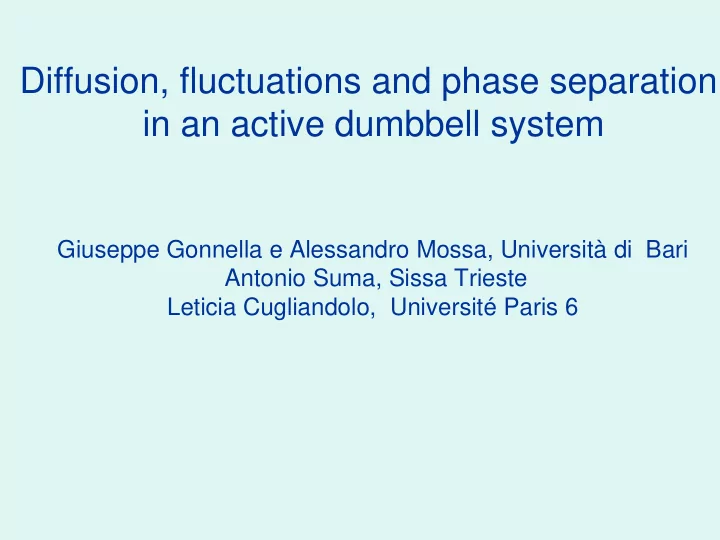

Diffusion, fluctuations and phase separation in an active dumbbell system Giuseppe Gonnella e Alessandro Mossa, Università di Bari Antonio Suma, Sissa Trieste Leticia Cugliandolo, Université Paris 6
Cluster formation in bacteria colonies A dense group of E. coli swims in the roughly two dimensional space at an air water interface. Their collective motion is significantly different from their motion as single cells. Under these conditions they behave more like an active fluid, hence changing the way that nutrients are shared within the group... Video courtesy Matthew Copeland, University of Wisconsin, Madison
Unusual diffusive behavior of tracers coupled to self-propelled particles This shows the effect of bacterial motion on micron-scale beads in a freely suspended soap film. Given the sizes of bacteria and beads, the geometry of the experiment is quasi-two-dimensional. Large positional fluctuations are observed for beads as large as 10 mm in diameter, and the measured mean-square displacements indicate superdiffusion in short times and normal diffusion in long times. Libchaber&Wu, PRL 2000
Motivations • How the dynamic behavior depends on self- propulsion? • Does self-propulsion induce phase separation? Is that affected by the shape of the particles? • How to characterize the kinetics of clusters? • Active systems exist in nonequilibrium conditions: Can they be described by an effective temperature? • How do fluctuations behave? Peruani, Deutsch, Ba …
Active dumbbells friction felt by each particle uncorrelated gaussian noise with zero average and unit variance includes the repulsive Weeks-Chandler-Anderson potential between each particle and the FENE potential for the two colloids of each dumbbell V/ ε r/ σ active force on each particle, constant in magnitude and directed along the main direction of the dumbbell
Dimensionless relevant numbers Diameter of each colloid in a dumbbell
In absence of activity
With activity at different temperatures
Phase transition Mechanism of aggregation
Phase diagram
Dynamics in the homogeneous phase: diffusion and fluctuations
Diffusion: single dumbbell Center of mass position: Relative position: Elongation and rotation: Translations:
Mean square displacement: finite density Single dumbbell:
Fluctuations in super- and sub-diffusive regimes Pe=40 Pe=2
Late diffusive regime
Dynamics of rotating clusters
Condensation of fluctuations? Inspired by exp work on conical particles in vibrating granular media by Kumar et al PRL2011
Condensation of energy fluctuations in a quenched ferromagnet GG&Corberi&Zannetti, JPA2014,PRE2015 etc Exact calculations show a discontinuity in the third derivative of the large deviation function
Kinetics of aggregation
Growth kinetics
Growth laws 2/3
Conclusions Very rich diffusion behavior. Rotational diffusion increases with density at large Peclet number. Non-gaussian fluctuations. Peculiar behavior of velocity fluctuations. Condensation? Motility-induced phase separation is favored by the shape of dumbbells. Clusters rotate. Angular velocity is proportional to the inverse of the radius; polarization shows a spiral pattern. Suma, Gonnella, Marenduzzo & Orlandini EPL 2014 Suma, Cugliandolo, Gonnella, Lamura, Mossa PRE 2014, Cugliandolo, Gonnella, Suma PRE 2015
Recommend
More recommend